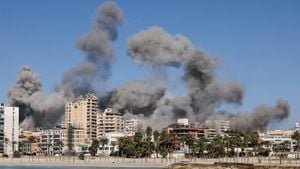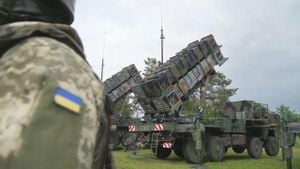The impending re-election of Donald Trump has sent ripples through the already volatile Middle East, particularly influencing the dynamics between Israel and Lebanon. With Trump on the cusp of clinching another presidential term, Israeli Prime Minister Binyamin Netanyahu has expressed optimism, seeing this as an opportunity for Israel to solidify its stance against Palestinians and to escalate military action against Hezbollah.
On the heels of recent airstrikes, reports indicate significant casualties from Israeli operations around the Lebanese city of Baalbek, with numbers reaching at least 30 dead and numerous others wounded. This surge of violence marks one of the most intense periods of conflict between Israel and Hezbollah since the outbreak of hostilities, which began following the devastating Hamas-led attacks on Israel on October 7, 2023.
Netanyahu's government appears emboldened with Trump's potential return to power, anticipating renewed U.S. support for Israeli military operations. Trump's previous tenure saw significant changes, including the controversial relocation of the U.S. embassy to Jerusalem and the Abraham Accords, which aimed to normalize relations between Israel and several Arab states. These actions were perceived as direct provocations to Palestinian interests and have contributed to the heightened tensions seen today.
Trump's close ties with Israel are well-documented, and his hardline approach is thought to fit neatly with Netanyahu’s views, particularly concerning the Palestinian territories and Iran’s influence across the region. Analysts fear this alignment could lead to increased aggression from Israel, exacerbated by Trump's known disregard for Palestinian rights. For his part, Trump has never shied away from asserting his pro-Israel stance, famously stating post-2020 election, “I kept Israel safe.”
Meanwhile, the humanitarian situation continues to deteriorate both in Gaza and Lebanon. The latest Israeli strikes have not only resulted in high civilian casualties but have also displaced thousands, with more than 68,000 residents already forced from their homes due to the conflict. Reports from local communities describe harrowing rescues and the dire search for missing loved ones amid the rubble of struck buildings.
The tension escalated when Netanyahu dismissed his Defense Minister Yoav Gallant, reflecting internal strife within his government over the military’s approach to Hezbollah and Palestinian territories. Gallant had expressed concern over the handling of hostages held by Hamas and the invasion of Gaza, clashing with the Prime Minister's more aggressive military strategy. Many Israelis took to the streets to protest this decision, highlighting the internal divisions and mounting pressure on the Israeli leadership during these turbulent times.
The international response has also been muted, with the United States attempting to mediate peace talks but facing challenges due to the political climate back home. Observers have noted the failure of U.S. efforts, particularly leading up to the elections, which have left room for on-the-ground escalations to continue unabated.
Netanyahu's recent military strategy appears focused not only on retaliatory strikes but also on broader objectives, including the systematic targeting of Hezbollah leaders. Following airstrikes, the Israeli Defense Forces (IDF) reported successful operations against numerous Hezbollah targets, effectively shifting the focus of military efforts toward Lebanon.
Hezbollah, for its part, has vowed to continue its attacks to prevent the return of Israeli citizens to their homes, adding another layer of complexity to the already fraught situation. The Lebanese militant group has managed to sustain its operations across the border, conducting rocket strikes and drone attacks, emboldened by both perceived popular support and Iranian backing.
The geopolitical stakes are high, with regional players watching closely. The potential for escalated hostilities is real, as Trump's policies may empower right-wing factions within Israel pushing for more aggressive military operations against both Hamas and Hezbollah. This scenario not only threatens the fragile peace but also raises fears of larger conflicts engulfing the region.
With diplomatic discussions faltering and military operations on the upswing, the situation remains precarious. Political observers and humanitarian organizations alike urge for conflict resolution mechanisms amid cries for peace, as the devastating human toll continues to mount.
Palestinian authorities have warned of genocide as Israel ramps up its military offense, asserting pressure on the international community to intervene and mediate. Observers of the situation fear Trump's return would mean unchecked military aggression and significant ramifications for both Palestinians and Lebanese citizens caught in the crossfire.
There’s cautious concern as the backdrop features calls for resistance against the prevailing narratives coming from their governments, underscoring the need for sustained mobilization within anti-war movements across the world. Activists are rallying not just for the Palestinian cause, but for global peace—to stop the escalation of violence and promote dialogue over war.
Reflecting on these miraculous chains of events, some experts argue only from widespread dialogue and negotiations can genuine resolutions emerge. The challenge remains finding those willing to listen.
While Netanyahu celebrates what he sees as renewed support from Washington with Trump’s impending presidential victory, the people of Lebanon, Gaza, and beyond face deepening crises. The results of the recent U.S. elections may just have set the stage for another chapter of conflict, with real-world consequences yet to be fully realized.



